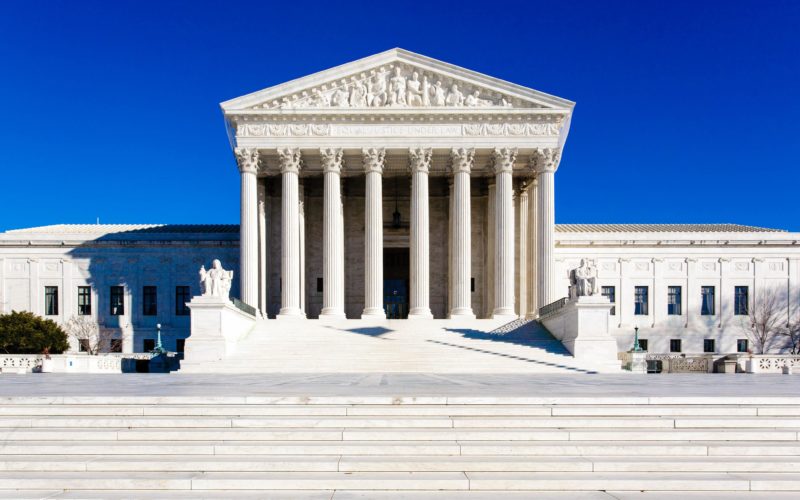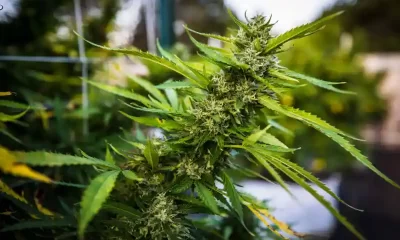Government
U.S. Supreme Court Rejects Cases Seeking Workers’ Comp for Medical Cannabis

The Supreme Court declined to hear two cases challenging Minnesota’s denial of workers’ compensation for medical pot used to treat work-related injuries.
The United States Supreme Court on Tuesday denied petitions to hear two cases challenging Minnesota’s refusal to allow coverage for medical cannabis through the state’s workers’ compensation program. In both cases, workers sought a review of the Minnesota Supreme Court’s decision finding that the federal Controlled Substances Act (CSA) supersedes state law, resulting in a denial of coverage for medicinal cannabis for the employees’ work-related injuries.
The Supreme Court invited the U.S. Department of Justice to file a brief in the case before making a decision. In its response, the Justice Department agreed with the Minnesota court that the CSA does preempt state law. But attorneys with the Justice Department also argued that the states have not adequately addressed the issue of federal preeminence and urged the Supreme Court to reserve judgment on evolving law.
The case was not the first time a state court had ruled on workers’ compensation coverage for medical pot. In 2014, the New Mexico Court of Appeals approved the reimbursement of claims for medicinal cannabis for work-related injuries. But rulings on similar cases in Maine, New Hampshire, New Jersey, New York and Minnesota have not been consistent. Courts in New Hampshire, New York, and New Jersey found that state law was not in conflict with the CSA and authorized workers’ compensation claims for medical cannabis. But in Maine, Massachusetts, and Minnesota, judges have ruled that federal law takes precedence.
Is the SCOTUS Decision Bad News?
Attorney Anne Davis, the co-founder of Bennabis Health, a company specializing in affordable medical cannabis access for patients, says that the Supreme Court’s decision to decline to hear the cases is not necessarily a negative outcome for patients.
“While I would’ve loved a decision by the federal government mandating that cannabis is in fact a covered benefit, [the court] deferring to the states could be good in the grand scheme of the industry,” Davis writes in an email to High Times. “The more that the Supreme Court defers to states’ rights, I think the more it helps our growing industry. If the federal government takes the hands-off approach and leaves it to states’ rights, that allows the cannabis industry to grow and expand.”
With states taking the lead on pot reform, Davis believes federal legislation that permits cannabis trade between the states would create the most favorable climate for the industry.
“The problem we’re left to deal with is interstate commerce,” said Davis. “If we can somehow navigate that, then I think state rights having control over the cannabis industry is a much better option than the federal government rescheduling and allowing big Pharma to take control.”
Some advocates for cannabis policy reform had hoped the Supreme Court would weigh in on the Minnesota cases following comments from Justice Clarence Thomas last year indicating he believes the federal prohibition on pot no longer makes sense with so many states passing legislation in conflict with federal law.
“A prohibition on intrastate use or cultivation of marijuana may no longer be necessary or proper to support the federal government’s piecemeal approach,” he wrote.
Unanswered Questions
Commentating on a case the Supreme Court declined to hear in which a Colorado cannabis dispensary challenged federal policy denying standard business deductions for weed companies, Thomas said that a 2005 high court ruling upholding the federal prohibition on cannabis possession may be out of date.
“Federal policies of the past 16 years have greatly undermined its reasoning,” he continued. “The federal government’s current approach is a half-in, half-out regime that simultaneously tolerates and forbids local use of marijuana.”
This week’s action by the U.S. Supreme Court leaves many unanswered questions about the viability of workers’ compensation coverage for medical cannabis. In an analysis of the denial to grant the petitions, The National Law Review wrote that the “Supreme Court’s decision to remain on the sidelines of the debate over marijuana legalization is disappointing to many who were hoping to see the high court help to break the logjam in Congress. The decision also leaves in place the clear conflict over workers’ compensation reimbursement of medical cannabis in state court decisions and facilitates the potential for further conflict as this issue continues to percolate throughout the country.”
Business
New Mexico cannabis operator fined, loses license for alleged BioTrack fraud

New Mexico regulators fined a cannabis operator nearly $300,000 and revoked its license after the company allegedly created fake reports in the state’s traceability software.
The New Mexico Cannabis Control Division (CCD) accused marijuana manufacturer and retailer Golden Roots of 11 violations, according to Albuquerque Business First.
Golden Roots operates the The Cannabis Revolution Dispensary.
The majority of the violations are related to the Albuquerque company’s improper use of BioTrack, which has been New Mexico’s track-and-trace vendor since 2015.
The CCD alleges Golden Roots reported marijuana production only two months after it had received its vertically integrated license, according to Albuquerque Business First.
Because cannabis takes longer than two months to be cultivated, the CCD was suspicious of the report.
After inspecting the company’s premises, the CCD alleged Golden Roots reported cultivation, transportation and sales in BioTrack but wasn’t able to provide officers who inspected the site evidence that the operator was cultivating cannabis.
In April, the CCD revoked Golden Roots’ license and issued a $10,000 fine, according to the news outlet.
The company requested a hearing, which the regulator scheduled for Sept. 1.
At the hearing, the CCD testified that the company’s dried-cannabis weights in BioTrack were suspicious because they didn’t seem to accurately reflect how much weight marijuana loses as it dries.
Company employees also poorly accounted for why they were making adjustments in the system of up to 24 pounds of cannabis, making comments such as “bad” or “mistake” in the software, Albuquerque Business First reported.
Golden Roots was fined $298,972.05 – the amount regulators allege the company made selling products that weren’t properly accounted for in BioTrack.
The CCD has been cracking down on cannabis operators accused of selling products procured from out-of-state or not grown legally:
- Regulators alleged in August that Albuquerque dispensary Sawmill Sweet Leaf sold out-of-state products and didn’t have a license for extraction.
- Paradise Exotics Distro lost its license in July after regulators alleged the company sold products made in California.
Golden Roots was the first alleged rulebreaker in New Mexico to be asked to pay a large fine.
Source: https://mjbizdaily.com/new-mexico-cannabis-operator-fined-loses-license-for-alleged-biotrack-fraud/
Business
Marijuana companies suing US attorney general in federal prohibition challenge

Four marijuana companies, including a multistate operator, have filed a lawsuit against U.S. Attorney General Merrick Garland in which they allege the federal MJ prohibition under the Controlled Substances Act is no longer constitutional.
According to the complaint, filed Thursday in U.S. District Court in Massachusetts, retailer Canna Provisions, Treevit delivery service CEO Gyasi Sellers, cultivator Wiseacre Farm and MSO Verano Holdings Corp. are all harmed by “the federal government’s unconstitutional ban on cultivating, manufacturing, distributing, or possessing intrastate marijuana.”
Verano is headquartered in Chicago but has operations in Massachusetts; the other three operators are based in Massachusetts.
The lawsuit seeks a ruling that the “Controlled Substances Act is unconstitutional as applied to the intrastate cultivation, manufacture, possession, and distribution of marijuana pursuant to state law.”
The companies want the case to go before the U.S. Supreme Court.
They hired prominent law firm Boies Schiller Flexner to represent them.
The New York-based firm’s principal is David Boies, whose former clients include Microsoft, former presidential candidate Al Gore and Elizabeth Holmes’ disgraced startup Theranos.
Similar challenges to the federal Controlled Substances Act (CSA) have failed.
One such challenge led to a landmark Supreme Court decision in 2005.
In Gonzalez vs. Raich, the highest court in the United States ruled in a 6-3 decision that the commerce clause of the U.S. Constitution gave Congress the power to outlaw marijuana federally, even though state laws allow the cultivation and sale of cannabis.
In the 18 years since that ruling, 23 states and the District of Columbia have legalized adult-use marijuana and the federal government has allowed a multibillion-dollar cannabis industry to thrive.
Since both Congress and the U.S. Department of Justice, currently headed by Garland, have declined to intervene in state-licensed marijuana markets, the key facts that led to the Supreme Court’s 2005 ruling “no longer apply,” Boies said in a statement Thursday.
“The Supreme Court has since made clear that the federal government lacks the authority to regulate purely intrastate commerce,” Boies said.
“Moreover, the facts on which those precedents are based are no longer true.”
Verano President Darren Weiss said in a statement the company is “prepared to bring this case all the way to the Supreme Court in order to align federal law with how Congress has acted for years.”
While the Biden administration’s push to reschedule marijuana would help solve marijuana operators’ federal tax woes, neither rescheduling nor modest Congressional reforms such as the SAFER Banking Act “solve the fundamental issue,” Weiss added.
“The application of the CSA to lawful state-run cannabis business is an unconstitutional overreach on state sovereignty that has led to decades of harm, failed businesses, lost jobs, and unsafe working conditions.”
Business
Alabama to make another attempt Dec. 1 to award medical cannabis licenses

Alabama regulators are targeting Dec. 1 to award the first batch of medical cannabis business licenses after the agency’s first two attempts were scrapped because of scoring errors and litigation.
The first licenses will be awarded to individual cultivators, delivery providers, processors, dispensaries and state testing labs, according to the Alabama Medical Cannabis Commission (AMCC).
Then, on Dec. 12, the AMCC will award licenses for vertically integrated operations, a designation set primarily for multistate operators.
Licenses are expected to be handed out 28 days after they have been awarded, so MMJ production could begin in early January, according to the Alabama Daily News.
That means MMJ products could be available for patients around early March, an AMCC spokesperson told the media outlet.
Regulators initially awarded 21 business licenses in June, only to void them after applicants alleged inconsistencies with how the applications were scored.
Then, in August, the state awarded 24 different licenses – 19 went to June recipients – only to reverse themselves again and scratch those licenses after spurned applicants filed lawsuits.
A state judge dismissed a lawsuit filed by Chicago-based MSO Verano Holdings Corp., but another lawsuit is pending.
Source: https://mjbizdaily.com/alabama-plans-to-award-medical-cannabis-licenses-dec-1/
-

 Business2 years ago
Business2 years agoPot Odor Does Not Justify Probable Cause for Vehicle Searches, Minnesota Court Affirms
-

 Business2 years ago
Business2 years agoNew Mexico cannabis operator fined, loses license for alleged BioTrack fraud
-

 Business2 years ago
Business2 years agoAlabama to make another attempt Dec. 1 to award medical cannabis licenses
-

 Business2 years ago
Business2 years agoWashington State Pays Out $9.4 Million in Refunds Relating to Drug Convictions
-

 Business2 years ago
Business2 years agoMarijuana companies suing US attorney general in federal prohibition challenge
-

 Business2 years ago
Business2 years agoLegal Marijuana Handed A Nothing Burger From NY State
-

 Business2 years ago
Business2 years agoCan Cannabis Help Seasonal Depression
-

 Blogs2 years ago
Blogs2 years agoCannabis Art Is Flourishing On Etsy













